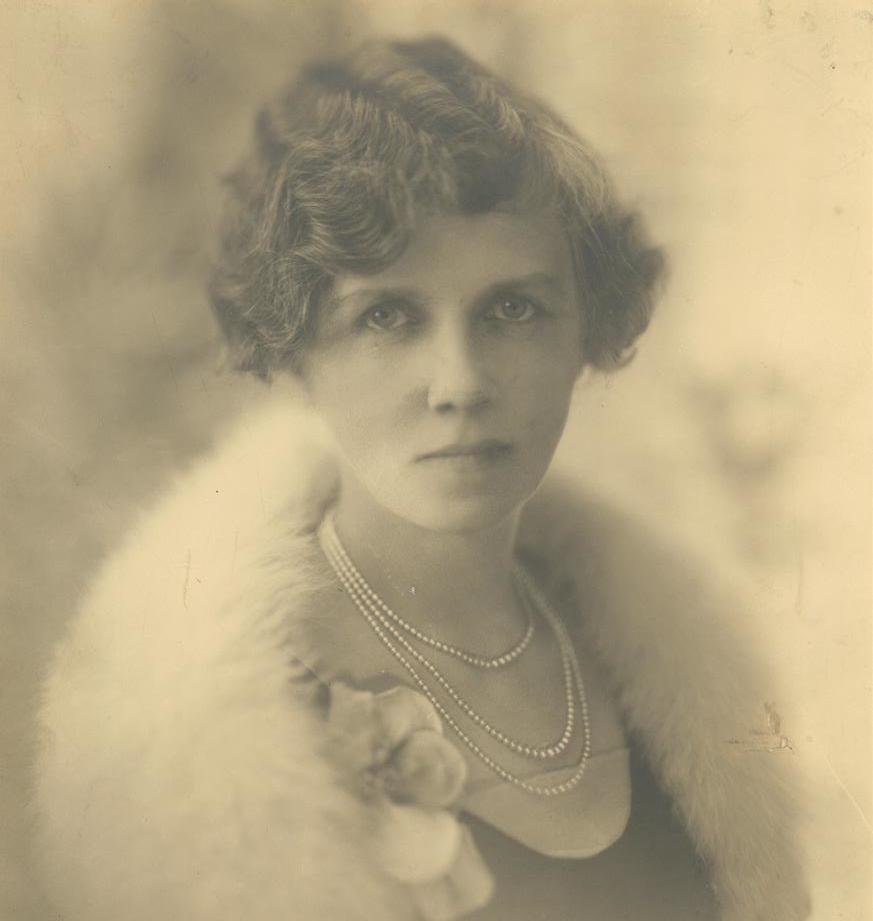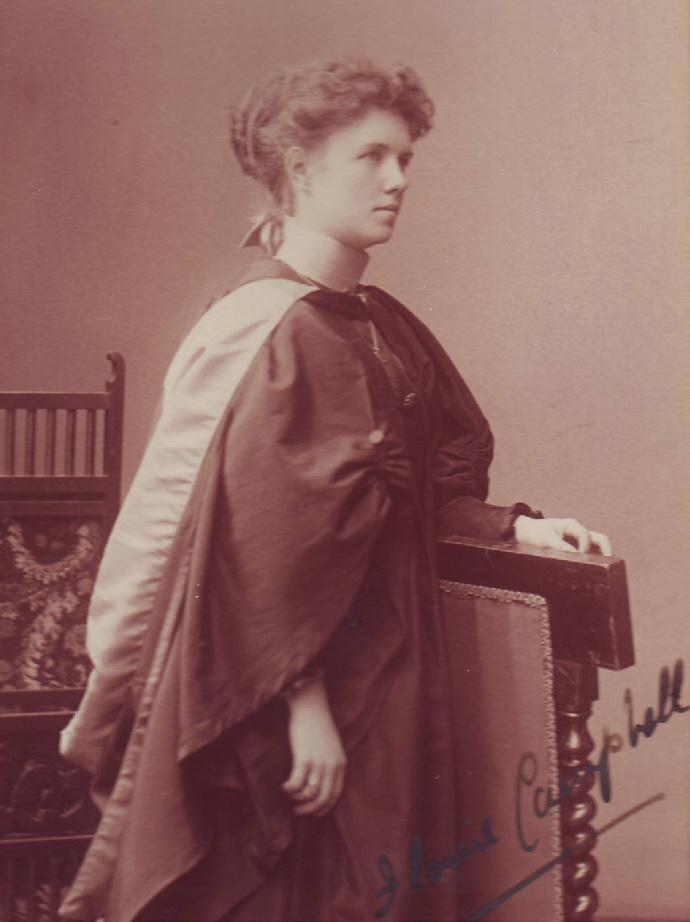
6 minute read
FLORENCE WAY CAMPBELL
AN ALUMNA OF FIRSTS
An unexpected phone call first drew my attention to a volume in Ruyton’s large collection of historic book prizes. ‘There’s a gentleman who would like to see a book he donated to Ruyton in 1996,’ I was told. ‘It was his grandmother’s. Could you give him a call?’ A few days, and a phone conversation later, I met John and Rose Downer in Henty House. Between us on the table sat a nineteenthcentury, leather bound book, The Works of William Shakespeare. Carefully opening the cover, we all admired the beautiful deep-red marbled endpapers and the elegant prize plate pasted in the centre. Early Principal Eliza Bromby’s handwritten inscription confirmed that this was indeed the prize presented to John Downer’s paternal grandmother, a boarder at Ruyton, ‘Awarded to Florrie Campbell, Dux Prize … [signed] E.M. Bromby, Xmas 1888.’ We talked for a time about Florence. Ruyton’s records of its earliest years are so scant that initially she seemed simply a name but as John outlined some of her life, she took shape in my mind. The ‘Florrie’ of our inscription was Florence Way Campbell. She came from a prominent family in Adelaide, her father Allan Campbell an eminent doctor and politician and her mother’s brother Samuel Way, the Chief Justice of South Australia for 40 years. In adult life she married Frederick Downer, whose family has produced four generations of South Australian politicians. How had she come to be at Ruyton in 1888, I wondered, given the School was only ten years old at the time, and in another colony from her own? There was a clue in something else John told me about her; Florence Campbell was a gifted pianist and intensely musical. My curiosity caught, I had to find out more about her. Later, thanks to the Downers’ visit, I open Miss Daniell’s Book, (the name given to Ruyton’s first enrolment register,) and am able to read the very first entry with new understanding. Begun by Eliza Bromby when she took over as Principal in 1888, it tells me that Florence Campbell, child of ‘Dr Campbell’ in Adelaide attended Ruyton in that year, departing in December. Elsewhere the name Florence Campbell sits among the first names on the Dux of the School honour board. Together with Florence’s book prize, I have now exhausted everything the School Archives have to share on Florence Campbell. Historic newspapers are where I turn next. Family notices and other brief mentions help fill out Florence’s story, but two key articles really bring her to life. My first discovery delights me. It is a short article in Adelaide’s Chronicle, 1897, entitled ‘A Clever Musician.’1 ‘Miss F.W. Campbell’, it reports, ‘was the recipient of the degree of Bachelor of Music’ at the University of Adelaide. ‘Miss Campbell whose whole course of study has been marked by conspicuous ability, is the first lady who as attained to this high honor (sic) in Australia.’ I’m gratified to be able to count a trailblazer like Florence among the earliest Ruytonians, and, because there is a line drawing of Miss Campbell sitting above the article, now I even know what she looks like! Calculating that she would have been 27 years old at the time, my glee is somewhat tempered by wondering about the social expectations Florence had to stare down in order to achieve her degree in that time and place. The clue is in the name, in that era Bachelor degrees were meant for men.
Advertisement
1 Chronicle, (Adelaide, South Australia), 25 December 1897, p20 2 Australische Zeitung (Adelaide, South Australia), 17 November 1886, p6 Images (left to right) 1 Florence Downer, c.1925. (private collection, supplied by the Downer family.) 2 In 1897 Florence Way Campbell was the first woman in
Australia to achieve a Bachelor of Music. (University of
Adelaide Archives http://hdl.handle.net/2440/89622) 3 Illustration of Florence Campbell 4 Florence Campbell was the first student listed when
Eliza Bromby began an Enrolment Register in 1888.


The second notable discovery is from another Adelaide newspaper, though this time it’s from 1886, and is in German. For South Australia’s significant German speaking population the Australische Zeitung reported on events across the country that had any Adelaide or local German connection. Amazingly, in 1886 they shared a glowing account of a Ruyton musical evening held at the Kew Recreation Hall by Frau James Anderson (known to us as Ruyton’s founder, Mrs Charlotte Anderson).2 Among a guest list remarkable in both size, (400 people), and it’s prominent members, (the Governor’s wife Lady Loch was in attendance,) ‘Dr.Campbell from Adelaide’ was among the first listed. In the flower and foliage festooned hall, the students, all dressed in white, demonstrated their impressive musical skills in the performance of several classical pieces. Among them were ‘the two Frauline Campbell from Adelaide, noted for their usual … brilliant performance.’ Undoubtedly explaining the Australische Zeitung’s interest, the whole event was conducted by the German-born Herr Julius Herz, who was not only the ‘esteemed director of music’ for Ruyton’s small student population, but also a leading light in the music world of 19th century Melbourne. My mind buzzes with all the information in this second article. When read in the knowledge of Florence’s later pioneering achievement in music it helps make sense of the questions raised when John Downer requested to see his grandmother’s prize book again. It is now clear that Florence Campbell attended Ruyton for at least three years from 1886–1888, and that for some of that time her older sister Jeanie Campbell was with her as a fellow boarder. Both of these discoveries extended the information contained in our own records about Ruyton’s earliest years. And the Campbell family’s choice of Ruyton, a school so far from their home? The 1886 article confirms that, though newly founded, Ruyton was already a place where the two Campbell daughters could be exposed to the experiences and education that would prepare them for an expected future among Adelaide’s most influential families. But Ruyton offered them more than that. It was a place where Florence’s own musical talents could be nurtured under the care of a talented teacher and overseen by a Principal who created an environment of excellence.
In looking into Florence’s story, I’d come to learn so much more about the first decade of Ruyton itself, and of the woman who I hadn’t been researching at all: Ruyton’s founder Charlotte Anderson. Yet again I am impressed by the energy and ability that enabled her to transform a small gathering of children in the parlour of her rented Kew home in 1878, into a flourishing and well-respected school that was able to attract notable inter-Colonial students a mere eight years later. It is a testament to her. Cathy Dodson Archivist

THE SILVER BATON
In the winter of 1898, Florence Campbell performed as part of an all-female musical event held at ‘Torrens Park’, the grand Adelaide home of the Barr-Smith family. The Critic reported that for an audience of ‘the fair sex only’, a programme of music, songs and recitations were all performed by ladies, and that ‘Miss Florence Campbell’s conducting of Romberg’s Toy Symphony was excellently done.’ To commemorate the unusual event Mrs Joanna Barr-Smith gifted a silver baton to Florence, and it remains today in the care of her family.











